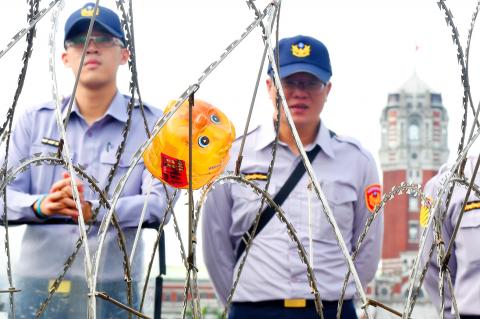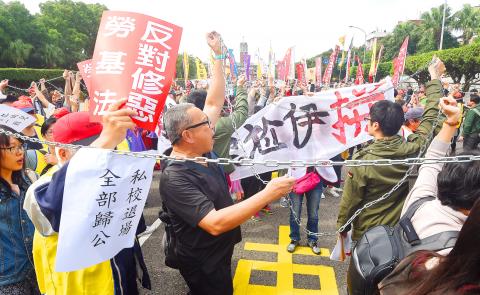The Autumn Struggle (秋鬥), an annual protest organized by labor rights advocates, yesterday rallied 61 groups as they marched down Taipei’s Ketagalan Boulevard and shouted their disappointment with the politics of the Democratic Progressive Party (DPP) administration.
The protest focused on the rights of local workers, migrant workers and people in education, as well as land expropriation.
Group representatives first voiced their demands at a news conference at the National Taiwan University Alumni Club before starting on a march toward the boulevard at 11am.

Photo: Liao Chen-huei, Taipei Times
Nearly 200 protesters threw plastic piggy banks that were used for President Tsai Ing-wen’s (蔡英文) fundraising during her presidential campaign toward the Presidential Office Building at the end of the boulevard.
The piggy banks, covered in “Taiwan Next” stickers, were collected from DPP supporters who have grown disillusioned with the party, land protection groups convener Chen Chih-hsiao (陳致曉) said.
When it comes to land use, the DPP has even strengthened the martial law-era authoritarian system it inherited from the Chinese Nationalist Party (KMT), Chen said.

Photo: Liao Chen-huei, Taipei Times
Many protesters had been affected by land expropriation and urban renewal projects.
Urban renewal projects are “nightmares that never end,” said New Taipei City Urban Renewal Self-help Association director Liu Chen-hua (劉振華), who is to be forcibly removed from his house in Jhonghe District (中和) if the city government approves a renewal project for the area.
Labor rights groups said the new amendment to the Labor Standards Act (勞動基準法) approved by the Cabinet on Thursday would deal a heavy blow to workers’ rights.
With the relaxation of the “one fixed day off” rule, the amendment would allow employees in certain industries to work up to 12 consecutive days, while the seven national holidays canceled in the amendment that introduced the rule would not be reinstated, they said.
Migrant workers called on the government to revoke the system of broker agencies and to legally protect the rights of household caregivers.
While the Autumn Struggle is one of the nation’s best-known labor protests, this year it attracted only 200 participants, a slide from about 500 last year and 2,000 to 3,000 protesters during former president Ma Ying-jeou’s (馬英九) term.
Organizers did not call for a large-scale mobilization this year because many groups have been occupied by different “battles” since the DPP government took office in May last year, fighting the Labor Standards Act and land expropriation, said Ku Yu-ling (顧玉玲), one of the founders of the event that has been held annually since 1988.
While civic groups used to harbor some hope that the DPP would do better, they now realized that the party has embraced far-right and capitalist policies even more tightly than the KMT, she said.
For example, Veterans Affairs Council Deputy Minister Lee Wen-chung (李文忠) has shown no leniency in oppressing residents of New Taipei City’s Daguan (大觀) community, and Premier William Lai (賴清德) has shown himself tough on labor rights and land development, she said.
When Lai speaks of inviting more foreign workers to work in Taiwan’s agriculture and long-term care services, he only thinks about the highly educated and has no attention for the large number of migrant workers from Southeast Asian nations, she said.

US President Donald Trump said "it’s up to" Chinese President Xi Jinping (習近平) what China does on Taiwan, but that he would be "very unhappy" with a change in the "status quo," the New York Times said in an interview published yesterday. Xi "considers it to be a part of China, and that’s up to him what he’s going to be doing," Trump told the newspaper on Wednesday. "But I’ve expressed to him that I would be very unhappy if he did that, and I don’t think he’ll do that," he added. "I hope he doesn’t do that." Trump made the comments in

NOT AN OPENING: Trump’s violation of international law does not affect China’s consideration in attacking Taiwan; Beijing lacks capability, not precedent, an official said Taiwanese officials see the US’ capture of the president of Venezuela as a powerful deterrent to Beijing’s aggression and a timely reminder of the US’ ability to defeat militaries equipped with Chinese-made weapons. The strikes that toppled Venezuelan President Nicolas Maduro signaled to authoritarian leaders, including Chinese President Xi Jinping (習近平), US President Donald Trump’s willingness to use military might for international affairs core to US interests, one senior official in Taipei’s security circle said. That reassured Taiwan, the person said. Taipei has also dismissed the idea that Trump’s apparent violation of international law could embolden Beijing, said the official, who was not

A cold surge advisory was today issued for 18 cities and counties across Taiwan, with temperatures of below 10°C forecast during the day and into tonight, the Central Weather Administration (CWA) said. New Taipei City, Taipei, Taoyuan and Hsinchu, Miaoli and Yilan counties are expected to experience sustained temperatures of 10°C or lower, the CWA said. Temperatures are likely to temporarily drop below 10°C in most other areas, except Taitung, Pingtung, Penghu and Lienchiang (Matsu) counties, CWA data showed. The cold weather is being caused by a strong continental cold air mass, combined with radiative cooling, a process in which heat escapes from

Snow this morning fell on Alishan for the first time in seven years, as a strong continental cold air mass sent temperatures plunging across Taiwan, the Central Weather Administration (CWA) said. The Alishan weather station, located at an elevation of about 2,200m in central Taiwan, recorded snowfall from 8:55am to 9:15am, when the temperature dropped to about 1°C, the CWA said. With increased moisture and low temperatures in the high-altitude Alishan area, the conditions were favorable for snow, CWA forecaster Tsai Yi-chi (蔡伊其) said. The last time snow fell at the Alishan weather station was on Jan. 10, 2018, while graupel fell there